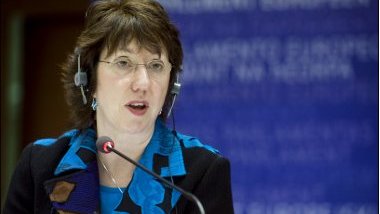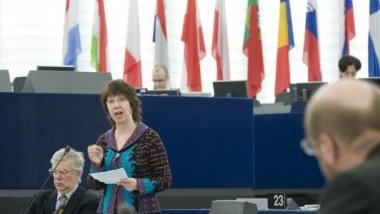The EEAS and the reflection about the European Civil Service
One of the main challenges of setting up the EEAS was to ensure consistency among the various dimensions of EU external action (CFSP/External action) and the responsibilities shared by the Member States, the Council and the Commission. This led to the decision to gather within the EEAS “officials from relevant departments of the General Secretariat of the Council and of the Commission as well as staff seconded from national diplomatic services of the Member States”, as the Lisbon Treaty simply puts it.
This new service was to be a test-case in the debate on the European Civil service and the Future of the “Community/Union method” which was launched in mid-2009 by the Group Europe of the UEF (federalists within the EU institutions). Group Europe holds that a European Civil Service based on permanence, competence and independence (from the Member States and from interest groups) is a key element in the shaping of a federal European Union. The EEAS was to prove the capacity of the Union to invent ways to bring together different types of staff while preserving the principles of the Union as fixed in the Treaty. These issues were discussed in public, with partners such as the organisations representing the staff and MEPS, all attached to the principles above
Even if some elements are still to define and nothing is perfect, the decision adopted by the Council on the 26th of July preserves the basic principles (Independence, Permanence, Competence) that ensure the good operation of the European civil service in the EEAS. This must be confirmed in the Autumn when the amendments to the EU Staff Regulation are reviewed and adopted. The officials in the EEAS will be in charge of responsibilities for the Institution or the State they originate from, which is a condition for their integral loyalty to the Service. They will have all guarantees to resume and continue their career in their institution or country of origin so that they can maintain a strong and lasting relation to the policy they developed in the service. On the other hand, equal treatment is ensured among all staff in the EEAS and all will be allowed to compete for jobs on an equal footing, if they wish to continue working in EEAS after their period of secondment. The selection of EEAS staff will be conducted under transparent EU procedures.
The EEAS could be proof that staff from different cultures and institutions can work together for the better interest of the EU while respecting the principles both of loyalty to the Union and of efficiency.
The analysis of the EEAS as regards to the four basic factors of a civil service (Michel Stavaux)
Independence:
– No order from any government, authority, organization or person outside the EEAS or any body or person other than the High Representative
– Guarantee by the members States to provide to their officials an immediate reinstatement at the end of their period of service to the EEAS
– Right for EU officials serving in the EEAS to apply for posts in their institution of origin on the same terms as internal applicants
Unity of Statute:
– All the staff with the same rights and privileges regardless of their organism of origin (Council, Commission or national services), treated equally according to the Staff Regulations of EU institutions
– No distinction between temporary agents and officials of the EU as regards the assignment of duties to perform in all areas of activities and policies implemented by the EEAS
– Statute of temporary agents for the staff from member States, on the basis of Conditions of employment for other servants (“CEOS”)
– All the staff of EU delegations under the authority of the Heads of Delegations
– Providing in short-term an “adequate common training, building in particular on existing national and EU practices and structures” to establish a common diplomatic culture
Permanence:
– Temporary agent contracts for eight years, plus two years maximum “in exceptional circumstances” and if “in the interest of the service” (more than the current limit of six years)
– Possibility for the diplomats of Member States of continuing their career in the EEAS, in competition and under the same conditions of application as for other member of the Service
– Recourse to specialized Seconded National Experts (SNEs) only “in specific cases”
Excellence:
– Recruitment based on merit whilst ensuring adequate geographical and gender balance
– All candidates for posts of Heads of Delegations subjected to selection procedures
– All vacant posts published and open to candidates from national diplomatic services
After getting one for External Actions, what about a European Civil Service for Internal Actions?
The EEAS could be proof that staff from different cultures and institutions can work together for the better interest of the EU while respecting the principles both of loyalty to the Union and of efficiency. The stakes are high for the European Union.
At the same time, the shaping of the EEAS could be viewed as the first step of a more audacious project: the setting up of a unified European Civil Service across the EU, irrespective of whether they are EU, national or local officials, leading to more efficient EU policies and activities at the service of European citizens. So do the Federalists wish for the near future.





Follow the comments: |
|
